Essential Vocabulary
胶囊助学计划新概念英语二笔记
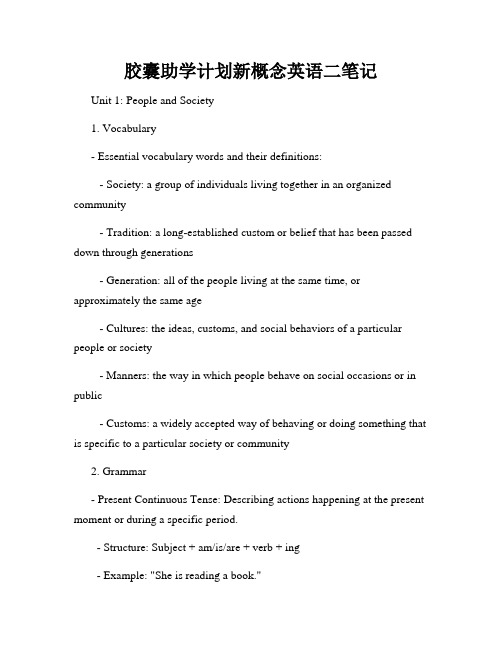
胶囊助学计划新概念英语二笔记Unit 1: People and Society1. Vocabulary- Essential vocabulary words and their definitions:- Society: a group of individuals living together in an organized community- Tradition: a long-established custom or belief that has been passed down through generations- Generation: all of the people living at the same time, or approximately the same age- Cultures: the ideas, customs, and social behaviors of a particular people or society- Manners: the way in which people behave on social occasions or in public- Customs: a widely accepted way of behaving or doing something that is specific to a particular society or community2. Grammar- Present Continuous Tense: Describing actions happening at the present moment or during a specific period.- Structure: Subject + am/is/are + verb + ing- Example: "She is reading a book."- Present Simple Tense: Describing routine or habitual actions.- Structure: Subject + verb (s/es)- Example: "They drink tea every morning."3. Listening- Exercise 1: Listen to the audio recording and fill in the missing information.- Extract key information from the conversation.- Complete the given statements or answer the questions.- Exercise 2: Listen to the audio recording and answer questions based on the information presented.- Identify the main idea and supporting details.- Infer information beyond what is explicitly mentioned.4. Reading- Exercise 1: Read the passage and answer the given questions.- Understand the main idea and supporting details.- Comprehend the author's purpose and tone.- Exercise 2: Read the passage and complete the sentences with the appropriate word(s).- Fill in the missing information based on contextual understanding.- Demonstrate vocabulary comprehension and grammar usage.Unit 2: Environment and Nature1. Vocabulary- Essential vocabulary words and their definitions:- Environment: the natural world and the conditions in which we live- Pollution: the presence or introduction of harmful substances or contaminants into the environment- Conservation: the protection and preservation of nature and natural resources- Renewable: capable of being replaced or replenished naturally- Endangered: at risk of extinction or destruction2. Grammar- Comparatives and Superlatives: Describing the degree of difference between two or more things.- Comparative: used to compare two things- Structure: adjective/adverb + er + than- Example: "She is taller than her sister."- Superlative: used to compare three or more things- Structure: the + adjective/adverb + est- Example: "He is the fastest runner in the class."3. Listening- Exercise 1: Listen to the audio recording and fill in the missing information.- Extract key information from the conversation.- Complete the given statements or answer the questions.- Exercise 2: Listen to the audio recording and answer questions based on the information presented.- Identify the main idea and supporting details.- Infer information beyond what is explicitly mentioned.4. Reading- Exercise 1: Read the passage and answer the given questions.- Understand the main idea and supporting details.- Comprehend the author's purpose and tone.- Exercise 2: Read the passage and complete the sentences with the appropriate word(s).- Fill in the missing information based on contextual understanding.- Demonstrate vocabulary comprehension and grammar usage.Unit 3: Travel and Adventure1. Vocabulary- Essential vocabulary words and their definitions:- Adventure: an exciting or unusual experience- Destination: a place to which someone or something is going or being sent- Journey: the act of traveling from one place to another- Explore: to travel in an unfamiliar area in order to learn about it- Tourist: a person who is traveling or visiting a place for pleasure2. Grammar- Past Simple Tense: Describing completed actions in the past.- Structure: Subject + past tense verb- Example: "I traveled to Paris last summer."- Past Continuous Tense: Describing actions that were happening at a specific time in the past.- Structure: Subject + was/were + verb + ing- Example: "We were walking in the park when it started to rain."3. Listening- Exercise 1: Listen to the audio recording and fill in the missing information.- Extract key information from the conversation.- Complete the given statements or answer the questions.- Exercise 2: Listen to the audio recording and answer questions based on the information presented.- Identify the main idea and supporting details.- Infer information beyond what is explicitly mentioned.4. Reading- Exercise 1: Read the passage and answer the given questions.- Understand the main idea and supporting details.- Comprehend the author's purpose and tone.- Exercise 2: Read the passage and complete the sentences with the appropriate word(s).- Fill in the missing information based on contextual understanding.- Demonstrate vocabulary comprehension and grammar usage.Please note that the format and structure presented here are for illustrative purposes only. You may modify them according to your specific requirements and the format of the actual notes you need for the "胶囊助学计划新概念英语二笔记".。
3500英语高考必备词汇2024新高考
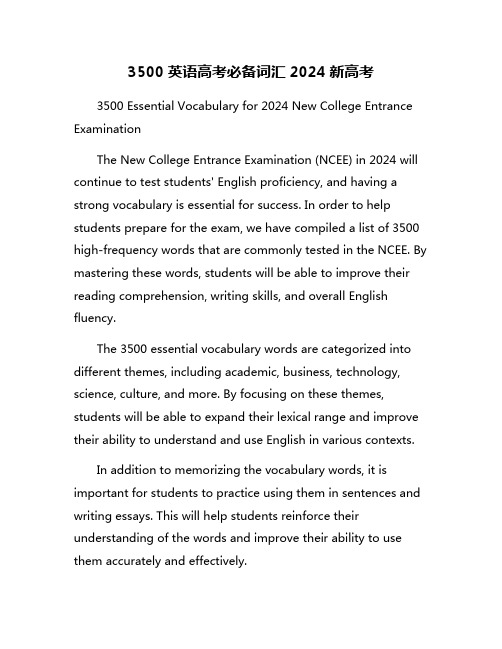
3500英语高考必备词汇2024新高考3500 Essential Vocabulary for 2024 New College Entrance ExaminationThe New College Entrance Examination (NCEE) in 2024 will continue to test students' English proficiency, and having a strong vocabulary is essential for success. In order to help students prepare for the exam, we have compiled a list of 3500 high-frequency words that are commonly tested in the NCEE. By mastering these words, students will be able to improve their reading comprehension, writing skills, and overall English fluency.The 3500 essential vocabulary words are categorized into different themes, including academic, business, technology, science, culture, and more. By focusing on these themes, students will be able to expand their lexical range and improve their ability to understand and use English in various contexts.In addition to memorizing the vocabulary words, it is important for students to practice using them in sentences and writing essays. This will help students reinforce their understanding of the words and improve their ability to use them accurately and effectively.Furthermore, students should engage in regular reading and listening exercises to further enhance their vocabulary skills. By exposing themselves to a wide range of English texts and audio materials, students will be able to encounter new words and phrases in context, which will help them better understand and remember the vocabulary.In conclusion, having a strong vocabulary is crucial for success in the 2024 New College Entrance Examination. By focusing on the 3500 essential words and practicing using them in various contexts, students will be able to improve their English language skills and achieve better results on the exam. Start building your vocabulary now and ace the NCEE in 2024!。
四级必备英语词汇

四级必备英语词汇Four Essential English Vocabulary for CET-4Abstract:English vocabulary is important for CET-4 preparation as it plays a vital role in reading, writing, listening, and speaking tasks. In this article, we will discuss four essential English vocabulary words that every CET-4 candidate should know. These words are versatile and can be used in various contexts, making them a must-have for successful communication in English.1. Proficient (adj.):Meaning: Having or showing skill and knowledge in a particular field.Example: She is proficient in playing the piano after years of dedicated practice.Usage: This word can be used to describe someone who possesses expertise in a specific area or is skilled at doing something.2. Ambiguous (adj.):Meaning: Open to more than one interpretation; unclear or uncertain.Example: The student's answer was ambiguous, and the teacher had a hard time understanding what they meant.Usage: This word is used to describe something that is not clear or definitive, often leading to confusion or misunderstandings.3. Acquire (v.):Meaning: To gain or obtain possession of something.Example: It takes time and effort to acquire a new language skill.Usage: This word is commonly used when talking about obtaining knowledge, skills, or possessions.4. Diligent (adj.):Meaning: Showing careful and persistent effort or work.Example: The diligent student spent hours studying for the exam and got excellent results.Usage: This word can be used to describe someone who is hardworking, thorough, and committed to achieving their goals.Conclusion:Mastering English vocabulary is crucial for success in the CET-4 exam. These four words, proficient, ambiguous, acquire, and diligent, are not only commonly tested but also widely applicable in various contexts. By understanding their meanings and usage, candidates will be better equipped to tackle reading comprehension, writing tasks, and express themselves effectively in English. Remember to practice using these words in different scenarios to enhance your language skills and boost your chances of passing the CET-4 exam with flying colors.。
托福必备词汇
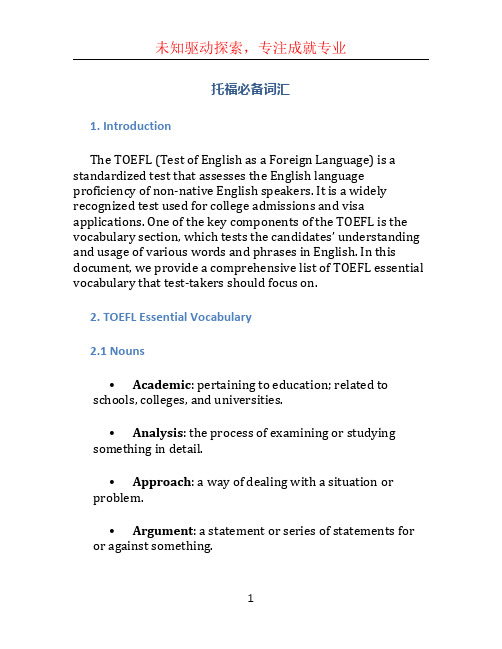
托福必备词汇1. IntroductionThe TOEFL (Test of English as a Foreign Language) is a standardized test that assesses the English language proficiency of non-native English speakers. It is a widely recognized test used for college admissions and visa applications. One of the key components of the TOEFL is the vocabulary section, which tests the candidates’ understanding and usage of various words and phrases in English. In this document, we provide a comprehensive list of TOEFL essential vocabulary that test-takers should focus on.2. TOEFL Essential Vocabulary2.1 Nouns•Academic: pertaining to education; related to schools, colleges, and universities.•Analysis: the process of examining or studying something in detail.•Approach: a way of dealing with a situation or problem.•Argument: a statement or series of statements for or against something.•Assumption: something that is believed to be true without proof.•Authority: the power or right to give orders, make decisions, or enforce obedience.•Behavior: the way in which someone conducts oneself.•Benefit: an advantage or profit gained from something.•Challenge: a difficult task or situation that requires effort to overcome.•Choice: an act of selecting or making a decision when faced with two or more possibilities.•Communication: the imparting or exchange of information or news.•Comparison: an examination of the similarities and differences between two or more things.•Conclusion: a judgment or decision reached after consideration.2.2 Verbs•Analyze: to examine or study something in detail.•Assess: to evaluate or estimate the nature, ability, or quality of something.•Contrast: to compare or show the differences between two things.•Define: to state or describe the exact meaning of something.•Demonstrate: to show or prove something by giving evidence or examples.•Determine: to decide or settle something conclusively.•Evaluate: to form an idea of the amount, number, or value of something.•Explain: to make something clear or easy to understand by describing or giving reasons for it.•Identify: to recognize, distinguish, or select something.•Illustrate: to provide examples, charts, or diagrams to make something clear or explain it.•Interpret: to explain the meaning of something.•Summarize: to give a brief statement of the main points of something.2.3 Adjectives•Accurate: correct, exact, or without any mistakes.•Cautious: careful to avoid problems or potential dangers.•Convincing: capable of causing someone to believe or accept something.•Efficient: achieving maximum productivity with minimum wasted effort or expense.•Influential: having great influence or power over others.•Objective: not influenced by personal feelings or opinions in considering or representing facts.•Significant: important, meaningful, or relevant.•Substantial: of considerable importance, size, or worth.•Valid: legally or officially acceptable, or logically correct.3. ConclusionIn order to succeed in the TOEFL, it is important to have a strong grasp of English vocabulary. This document provides a comprehensive list of TOEFL essential vocabulary, categorizedinto nouns, verbs, and adjectives. By studying and practicing the words and phrases listed here, test-takers can enhance their vocabulary skills and improve their performance on the TOEFL examination. Remember to use these words in context when practicing, as understanding their meanings and usage in real-life situations is crucial. Good luck with your TOEFL preparation!。
六级作文常用词汇短语
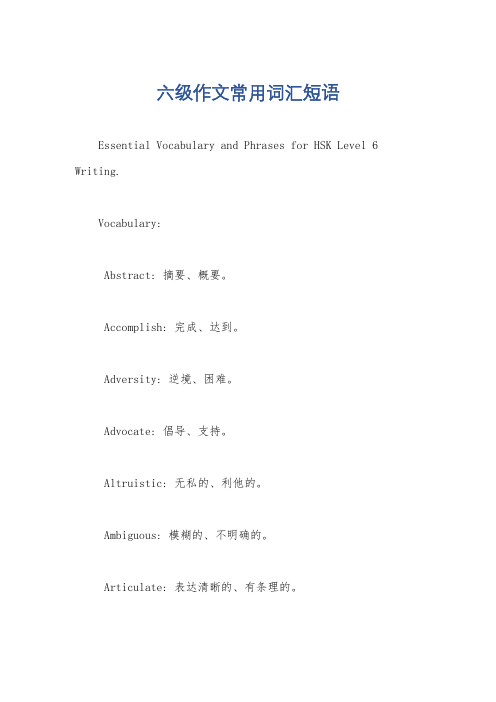
六级作文常用词汇短语Essential Vocabulary and Phrases for HSK Level 6 Writing.Vocabulary:Abstract: 摘要、概要。
Accomplish: 完成、达到。
Adversity: 逆境、困难。
Advocate: 倡导、支持。
Altruistic: 无私的、利他的。
Ambiguous: 模糊的、不明确的。
Articulate: 表达清晰的、有条理的。
Assertive: 自信的、有主见的。
Attain: 获得、达到。
Authentic: 真实的、可信的。
Phrases:Analyze the current situation: 分析当前形势。
Construct a comprehensive plan: 制定全面计划。
Demonstrate a clear understanding: 表现出清晰的理解。
Develop a well-structured response: 提出结构良好的对策。
Evaluate the pros and cons: 权衡利弊。
Formulate a sound argument: 形成有力的论据。
Highlight the significance: 强调重要性。
Identify key issues: 找出关键问题。
Implement effective strategies: 实施有效战略。
Maintain a critical perspective: 保持批判性视角。
中文回答:常用的词汇:抽象。
完成。
逆境。
倡导。
无私。
模糊。
自信。
获得。
真实。
常用的词组:分析当前形势。
制定全面计划。
表现出清晰的理解。
提出结构良好的对策。
权衡利弊。
形成有力的论据。
找出关键问题。
实施有效战略。
保持批判性视角。
考研英语作文必备词汇

考研英语作文必备词汇Certainly! Here's a list of essential vocabulary for writing a postgraduate entrance examination (commonly known as the "Gao Kao") English essay:1. Academic Achievement - 学术成就2. Advocate - 提倡3. Ambition - 雄心4. Analyze - 分析5. Approach - 方法6. Assess - 评估7. Balance - 平衡8. Challenge - 挑战9. Collaboration - 合作10. Competence - 能力11. Cultural Diversity - 文化多样性12. Debate - 辩论13. Develop - 发展14. Diligence - 勤奋15. Economic Growth - 经济增长16. Efficiency - 效率17. Employment Opportunities - 就业机会18. Environmentally Friendly - 环保的19. Ethical Issues - 道德问题20. Globalization - 全球化21. Healthcare - 医疗保健22. Innovation - 创新23. Integration - 整合24. Interpersonal Skills - 人际交往能力25. Leadership - 领导力26. Motivation - 动机27. Opportunity - 机会28. Perseverance - 毅力29. Perspective - 视角30. Policy - 政策31. Prejudice - 偏见32. Productivity - 生产力33. Quality Education - 素质教育34. Responsibility - 责任35. Sustainability - 可持续性36. Technological Advancements - 技术进步37. Tolerance - 宽容38. Tradition - 传统39. Urbanization - 城市化40. Vision - 视野When writing your essay, remember to use these words in context to enhance the quality and sophistication of your writing. Additionally, ensure that you understand the nuances of each word and use them appropriately to convey your ideas effectively.。
理解四级高频词汇essential
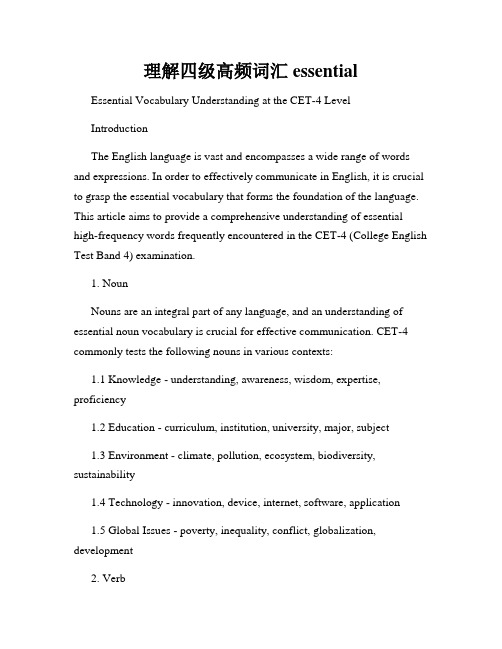
理解四级高频词汇essentialEssential Vocabulary Understanding at the CET-4 LevelIntroductionThe English language is vast and encompasses a wide range of words and expressions. In order to effectively communicate in English, it is crucial to grasp the essential vocabulary that forms the foundation of the language. This article aims to provide a comprehensive understanding of essential high-frequency words frequently encountered in the CET-4 (College English Test Band 4) examination.1. NounNouns are an integral part of any language, and an understanding of essential noun vocabulary is crucial for effective communication. CET-4 commonly tests the following nouns in various contexts:1.1 Knowledge - understanding, awareness, wisdom, expertise, proficiency1.2 Education - curriculum, institution, university, major, subject1.3 Environment - climate, pollution, ecosystem, biodiversity, sustainability1.4 Technology - innovation, device, internet, software, application1.5 Global Issues - poverty, inequality, conflict, globalization, development2. VerbUnderstanding essential verbs allows learners to express actions, thoughts, and feelings accurately. The CET-4 examination often assesses the usage of high-frequency verbs such as:2.1 Communication - convey, express, articulate, interact, negotiate2.2 Learning - acquire, comprehend, memorize, analyze, synthesize2.3 Decision Making - evaluate, prioritize, determine, resolve, implement2.4 Adaptation - adjust, accommodate, cope, integrate, assimilate2.5 Achievement - accomplish, succeed, excel, innovate, progress3. AdjectiveAdjectives play a vital role in enhancing language precision by describing or qualifying nouns. Mastery of essential adjectives enables clearer communication. CET-4 frequently tests the following adjectives:3.1 Descriptive - efficient, effective, reliable, accurate, comprehensive3.2 Emotional - ecstatic, profound, content, grateful, enthusiastic3.3 Evaluative - significant, crucial, exceptional, exemplary, beneficial3.4 Comparative - superior, inferior, optimal, relevant, prominent3.5 Visual - vibrant, picturesque, breathtaking, stunning, captivating4. AdverbAdverbs modify verbs, adjectives, or other adverbs, providing additional information about the action or state expressed. Essential adverbs help refine language skills. Examples of frequently tested adverbs in CET-4 include:4.1 Time - frequently, eventually, simultaneously, temporarily, consistently4.2 Manner - carefully, efficiently, deliberately, passionately, attentively4.3 Degree - extremely, moderately, significantly, barely, entirely4.4 Frequency - occasionally, regularly, rarely, consistently, seldom4.5 Place - everywhere, nearby, abroad, indoors, underground5. Phrasal VerbsPhrasal verbs are combinations of a verb and a particle, creating idiomatic expressions with distinct meanings. Proficiency in essential phrasal verbs enhances language fluency. Common phrasal verbs tested in CET-4 include:5.1 Look forward to - anticipate with excitement or pleasure5.2 Carry out - perform or complete a task or plan5.3 Make up - invent or create a story or excuse5.4 Set up - establish or arrange something5.5 Take off - remove clothing or have a successful startConclusionAn extensive vocabulary is essential for effective communication and success in the English language. This article aimed to provide a comprehensive understanding of essential high-frequency words often encountered in the CET-4 examination.By mastering the nouns, verbs, adjectives, adverbs, and phrasal verbs outlined above, learners can enhance their language skills, enrich their writing and speaking abilities, and navigate the CET-4 examination confidently. Remember, building a strong vocabulary is a gradual process that requires consistent practice and exposure to the English language in various contexts.。
四级高频词汇解读essential

四级高频词汇解读essentialEssential: Explicating High-Frequency Vocabulary for CET-4IntroductionVocabulary acquisition plays a pivotal role in language learning and proficiency improvement. As one of the most widely recognized English language tests, CET-4 (College English Test Band 4) requires solid knowledge of high-frequency words. In this article, we will delve into the meaning, usage, and examples of ten essential CET-4 vocabulary words, providing a comprehensive understanding of these words.1. Essential (adj.) - extremely important or necessaryThe word "essential" is used to describe something that is crucial or indispensable. It highlights the significance and relevance of a particular object, action, or concept. For instance, in an academic setting, diligent note-taking is essential for effective learning.Example sentence: Paying attention during lectures is essential for academic success.2. Significant (adj.) - important or meaningful"Significant" is synonymous with essential, representing something that holds importance or is substantial in nature. It is often used when discussing the impact, magnitude, or relevancy of an event, discovery, or issue. For example, scientific research plays a significant role in advancing society.Example sentence: The discovery of antibiotics was a significant breakthrough in medicine.3. Enthusiasm (n.) - intense excitement or interest"Enthusiasm" refers to a strong sense of passion, excitement, or interest in a particular subject or activity. This word is frequently used in contexts related to motivation, engagement, and dedication. In many successful endeavors, enthusiasm is the driving force behind achievements.Example sentence: Her enthusiasm for art is evident in her vibrant paintings.4. Contribute (v.) - to play a part in achieving a goal or outcome"Contribute" signifies the act of playing a positive role or making an active contribution towards a specific result. It suggests a collaborative and collective effort in accomplishing a common objective. For instance, teamwork is crucial in contributing to organizational success.Example sentence: Our joint efforts contributed to the success of the project.5. Emphasize (v.) - to give special attention or importance to somethingWhen we "emphasize" something, we highlight its significance or draw special attention to it. This word is used when we want to underscore a particular aspect or idea, emphasizing its importance in a given context. In effective communication, emphasis aids in conveying the intended message clearly.Example sentence: The teacher emphasized the importance of punctuality in class.6. Evaluate (v.) - to assess or determine the value or quality of something"Evaluate" involves analyzing and forming a judgment about the quality, value, or significance of a particular object, idea, or situation. This word is commonly used in academic, professional, or assessment-related contexts. Evaluation is an essential process in determining progress or success.Example sentence: The committee will evaluate the candidates' qualifications before making a decision.7. Demonstrate (v.) - to show or prove something with evidence or examples"To demonstrate" means to display, exhibit, or illustrate a concept, skill, or point of view through visible or tangible evidence. This word emphasizes the act of presenting clear and convincing proof to support a claim or idea. Demonstrating proficiency in a foreign language requires consistent practice.Example sentence: The experiment demonstrated the effectiveness of the new treatment.8. Enhance (v.) - to improve or increase the value, quality, or extent of somethingThe word "enhance" implies the act of strengthening, improving, or enriching a particular object, skill, or experience. It signifies a positive transformation or betterment of a given situation or attribute. Taking additional courses can enhance one's knowledge and skills.Example sentence: Regular exercise can enhance both physical and mental well-being.9. Adapt (v.) - to adjust or modify to fit new circumstances or conditionsThe verb "adapt" conveys the idea of changing or adjusting to new situations, environments, or requirements. It stresses the importance of flexibility, resilience, and the willingness to make modifications as needed. Cultural adaptability is crucial when moving to a foreign country.Example sentence: She had to adapt quickly to the fast-paced work environment.10. Achieve (v.) - to successfully reach a desired objective or goalTo "achieve" means to successfully attain or accomplish a specific objective, task, or ambition. It emphasizes reaching a goal through dedicated efforts, perseverance, and determination. Setting realistic goals can motivate individuals to achieve personal and professional success.Example sentence: With hard work and determination, he was able to achieve his dream of becoming a doctor.ConclusionThe ten high-frequency words discussed in this article are essential for CET-4 exam preparation and English language proficiency. Acquiring a solid understanding of these words will greatly enhance your vocabulary skills and overall linguistic competence. By grasping their meanings, usages, and examples, you will be better equipped to comprehend and use them effectively in various contexts. Remember, building vocabulary is an ongoing process; embrace it with enthusiasm and dedication.。
材料工程专业英语词汇
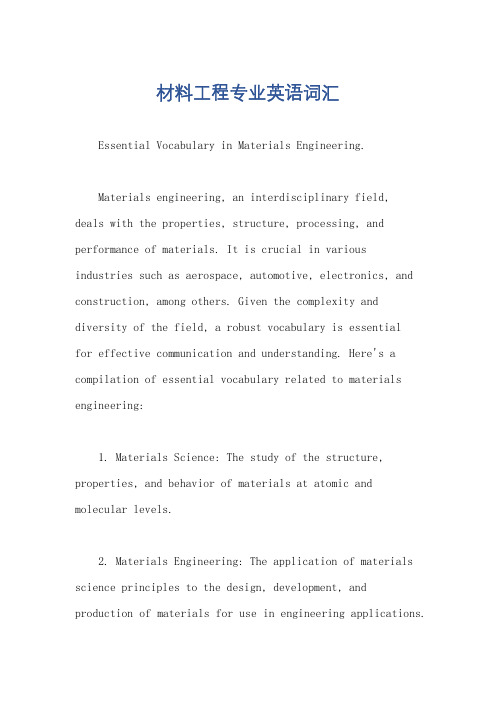
材料工程专业英语词汇Essential Vocabulary in Materials Engineering.Materials engineering, an interdisciplinary field,deals with the properties, structure, processing, and performance of materials. It is crucial in variousindustries such as aerospace, automotive, electronics, and construction, among others. Given the complexity and diversity of the field, a robust vocabulary is essentialfor effective communication and understanding. Here's a compilation of essential vocabulary related to materials engineering:1. Materials Science: The study of the structure, properties, and behavior of materials at atomic and molecular levels.2. Materials Engineering: The application of materials science principles to the design, development, and production of materials for use in engineering applications.3. Phase: A distinct thermodynamic state of matter, characterized by uniform chemical composition and structure throughout.4. Microstructure: The arrangement and configuration of atoms, molecules, or ions within a material, which determines its mechanical, electrical, and other properties.5. Alloy: A material made by combining two or more elements, at least one of which is a metal.6. Polymer: A large molecule composed of repeating structural units, often formed by chemical reactions between monomers.7. Composite: A material made up of two or more constituent materials with distinct properties, combined to create a material with desired overall properties.8. Ceramic: A solid material made from inorganic non-metallic compounds, typically hard, brittle, and heat-resistant.9. Metallurgy: The science and technology of working with metals, including their extraction, purification, alloying, and processing.10. Crystallography: The study of the internal structure of crystals, including their atomic arrangement and symmetry.11. Nanomaterials: Materials with dimensions on the nanometer scale (1-100 nm), exhibiting unique physical, chemical, and mechanical properties.12. Biomaterials: Materials used in medical applications, such as implants, prostheses, and drug delivery systems, that interact with biological systems.13. Smart Materials: Materials that can respond to external stimuli, such as temperature, stress, or electromagnetic fields, by altering their properties.14. Fatigue: The progressive damage accumulation in a material due to repeated stress cycles, leading to failure.15. Corrosion: The degradation of materials due to chemical or electrochemical reactions with their environment.16. Fracture: The separation of a material into two or more pieces due to the application of stress exceeding its strength.17. Plasticity: The ability of a material to deform permanently without fracturing under applied stress.18. Elasticity: The ability of a material to recoverits original shape and size after deformation caused by applied stress.19. Diffusion: The spontaneous movement of atoms or molecules from a region of higher concentration to a region of lower concentration.20. Sintering: The process of joining powder particles into a solid mass by heating them to a temperature below their melting point.This list provides a foundation of vocabulary essential for materials engineering. However, the field is vast and constantly evolving, necessitating continuous learning and expansion of vocabulary. The terminology used in materials engineering is often specific and technical, making it crucial for professionals in the field to stay updated with the latest terminology and concepts.。
英语作文必须掌握的词汇
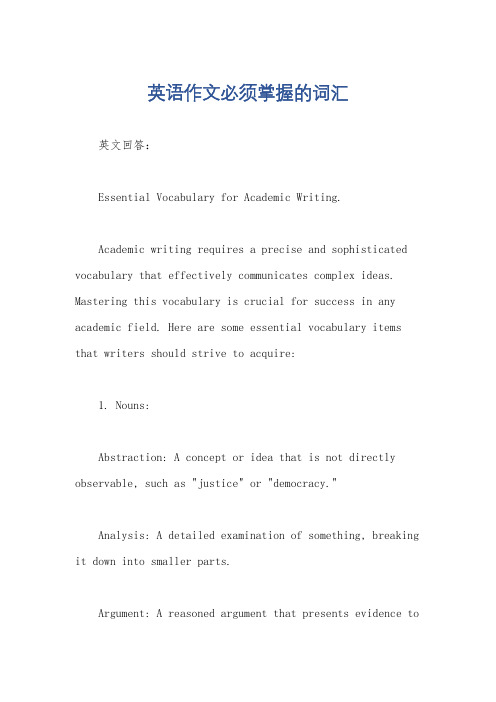
英语作文必须掌握的词汇英文回答:Essential Vocabulary for Academic Writing.Academic writing requires a precise and sophisticated vocabulary that effectively communicates complex ideas. Mastering this vocabulary is crucial for success in any academic field. Here are some essential vocabulary items that writers should strive to acquire:1. Nouns:Abstraction: A concept or idea that is not directly observable, such as "justice" or "democracy."Analysis: A detailed examination of something, breaking it down into smaller parts.Argument: A reasoned argument that presents evidence tosupport a particular claim.Critique: A critical evaluation of something, identifying its strengths and weaknesses.Hypothesis: A proposed explanation that is subject to testing and verification.2. Verbs:Analyze: To break something down into its smaller parts and examine it.Argue: To present evidence to support a particular claim or position.Critique: To evaluate something critically, identifying its strengths and weaknesses.Evaluate: To assess the value or significance of something.Hypothesize: To propose an explanation or theory based on limited evidence.3. Adjectives:Abstract: Not directly observable or concrete, such as "theoretical" or "philosophical."Analytical: Characterized by a detailed examination or analysis.Critical: Involving or expressing a careful judgment or evaluation.Empirical: Based on observation or experience, rather than theory.Objective: Not influenced by personal opinion or bias.4. Adverbs:Accordingly: In a way that follows logically fromsomething else.Consequently: As a result of something else.Empirically: Based on observation or experience.Objectively: In a manner that is not influenced by personal opinion or bias.Theoretically: In theory, but not necessarily in practice.5. Phrases:For example: To provide an illustrative example.In other words: To clarify or restate something.On the other hand: To introduce a contrasting viewpoint or argument.To summarize: To provide a brief overview or conclusion.With respect to: In relation to something else.中文回答:学术写作必备词汇。
英语新概念单词小本
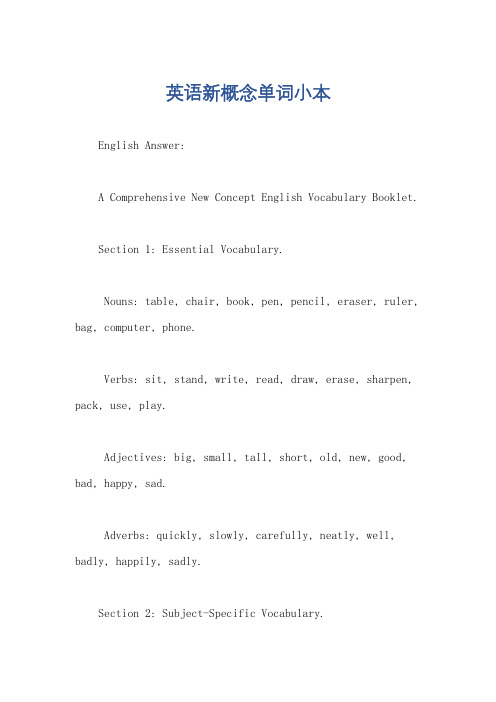
英语新概念单词小本English Answer:A Comprehensive New Concept English Vocabulary Booklet.Section 1: Essential Vocabulary.Nouns: table, chair, book, pen, pencil, eraser, ruler, bag, computer, phone.Verbs: sit, stand, write, read, draw, erase, sharpen, pack, use, play.Adjectives: big, small, tall, short, old, new, good, bad, happy, sad.Adverbs: quickly, slowly, carefully, neatly, well, badly, happily, sadly.Section 2: Subject-Specific Vocabulary.Math: number, addition, subtraction, multiplication, division, equation, fraction, decimal.Science: experiment, hypothesis, data, conclusion, microscope, test tube, beaker, energy.History: time, event, person, place, cause, effect, war, peace.Section 3: Everyday Vocabulary.Food: bread, milk, eggs, cheese, vegetables, fruit, meat, fish.Drink: water, juice, soda, coffee, tea, beer, wine.Clothes: shirt, pants, dress, skirt, shoes, socks.Transportation: car, bus, train, plane, bike.Section 4: Idioms and Phrases.Idioms: a piece of cake, under the weather, out of the blue.Phrases: by the way, in other words, at first sight.Section 5: Phrasal Verbs.Phrasal verbs: look up, give up, turn on, switch off.Section 6: Prepositions and Conjunctions.Prepositions: in, on, at, by, to, from, with, about.Conjunctions: and, but, or, because, so, however.中文回答:新概念英语词汇小本。
剑桥通用英语五级词汇必备

剑桥通用英语五级词汇必备Here is a 1000+ word essay on the topic "Essential Vocabulary for Cambridge English: Proficiency (CPE)":The Cambridge English: Proficiency (CPE) exam is one of the most prestigious and challenging English language proficiency tests available. Achieving a high score on the CPE requires not only advanced grammar and fluency skills but also a mastery of a vast vocabulary. The exam tests candidates' ability to understand and use a wide range of vocabulary across various topics and registers. In this essay, we will explore the essential vocabulary that aspirants must acquire to succeed on the CPE exam.One of the key aspects of CPE vocabulary is the breadth and depth of coverage. The exam assesses a candidate's knowledge of high-frequency words as well as more specialized, low-frequency vocabulary. This includes words from academic and professional domains, as well as more colloquial and idiomatic expressions. Candidates must be able to use these words accurately and appropriately in various contexts.A core component of the essential CPE vocabulary is academic andformal language. This encompasses words and phrases commonly used in educational settings, research, and professional environments. Examples include "hypothesis," "methodology," "empirical," "corroborate," and "substantiate." Mastering these academic terms is crucial for performing well on the reading and writing tasks, which often involve analyzing complex texts and constructing well-reasoned arguments.In addition to academic vocabulary, CPE candidates must also be proficient in more general, high-frequency words that are essential for effective communication in a variety of situations. These include words related to everyday activities, emotions, opinions, and abstract concepts. Examples include "accommodate," "apprehensive," "discern," "ponder," and "relinquish." Being able to use these words fluently and accurately demonstrates a candidate's overall language proficiency.Another crucial aspect of CPE vocabulary is the ability to understand and use idiomatic expressions and collocations. Idiomatic expressions, such as "let the cat out of the bag," "hit the nail on the head," and "add insult to injury," can be particularly challenging for non-native speakers. Collocations, which are the typical combinations of words (e.g., "make a decision," "pose a threat," "deep sleep"), are also essential for achieving a high score on the exam.Furthermore, CPE candidates must be familiar with a range of vocabulary related to current affairs, social issues, and cultural topics. This includes words and phrases associated with politics, the environment, technology, the arts, and other areas of contemporary relevance. Examples include "austerity measures," "carbon footprint," "algorithm," "avant-garde," and "gentrification." Being able to discuss these topics using appropriate vocabulary showcases a candidate's breadth of knowledge and language skills.To develop the essential vocabulary for the CPE exam, aspirants should employ a multi-faceted approach. This includes extensive reading of high-quality academic and professional literature, regular exposure to English-language media, and targeted vocabulary building exercises. Techniques such as creating vocabulary lists, using flashcards, and engaging in conversations with native speakers can also be highly effective.Additionally, candidates should familiarize themselves with common prefixes, suffixes, and root words, as this knowledge can aid in deducing the meaning of unfamiliar words and expanding their overall vocabulary. Understanding word relationships, such as synonyms, antonyms, and connotations, is also crucial for demonstrating nuanced language skills on the CPE exam.In conclusion, the essential vocabulary for the Cambridge English: Proficiency (CPE) exam is vast and multifaceted. Aspirants must develop a deep understanding of academic and formal language, high-frequency words, idiomatic expressions, and vocabulary related to current affairs and cultural topics. By adopting a comprehensive and systematic approach to vocabulary building, candidates can significantly enhance their chances of achieving a high score on this prestigious English language proficiency exam.。
高考英文作文必备词汇
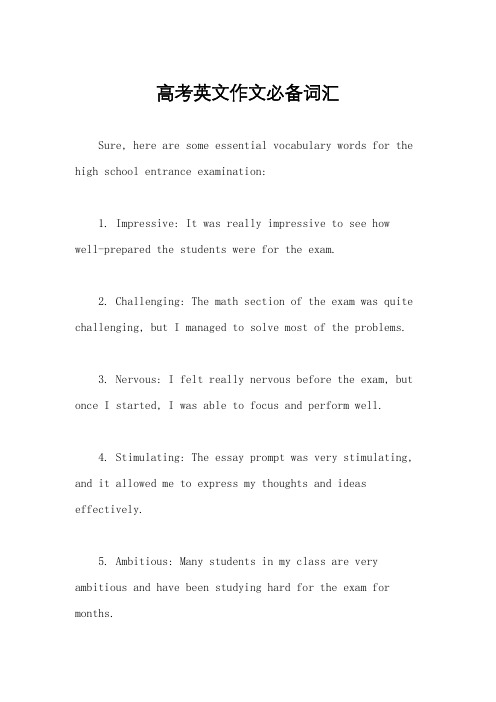
高考英文作文必备词汇Sure, here are some essential vocabulary words for the high school entrance examination:1. Impressive: It was really impressive to see how well-prepared the students were for the exam.2. Challenging: The math section of the exam was quite challenging, but I managed to solve most of the problems.3. Nervous: I felt really nervous before the exam, but once I started, I was able to focus and perform well.4. Stimulating: The essay prompt was very stimulating, and it allowed me to express my thoughts and ideas effectively.5. Ambitious: Many students in my class are very ambitious and have been studying hard for the exam for months.6. Determined: I am determined to do well on the exam and get into my dream school.7. Exhausted: After studying for hours, I felt exhausted and needed a break.8. Motivated: The competition among students is high, which motivated me to work harder and strive for success.9. Satisfied: I felt satisfied with my performance on the exam and believe I did my best.10. Anxious: I couldn't help but feel anxious while waiting for the exam results.11. Frustrated: Some questions on the exam were quite tricky, and it frustrated me when I couldn't figure out the answers.12. Relieved: When I found out that I passed the exam,I felt relieved and happy.13. Disappointed: Unfortunately, I didn't score as well as I had hoped on the exam, and I was disappointed in myself.14. Confident: I went into the exam feeling confident because I had prepared thoroughly.15. Overwhelmed: The amount of material to study for the exam was overwhelming, but I managed to cover everything.Remember, it's important to practice using these words in different contexts to improve your overall language skills. Good luck with your exam!。
四级英语必备词汇4000

四级英语必备词汇4000Mastering a language requires a comprehensive understanding of its vocabulary. For students preparing for the College English Proficiency Test, also known as the CET-4, building a strong vocabulary of 4000 essential words is crucial. These words encompass a wide range of topics and are commonly used in academic and professional settings. By dedicating time and effort to learning these 4000 words, students can significantly improve their chances of success on the CET-4 and enhance their overall language proficiency.The CET-4 is a standardized test administered in China to assess the English language skills of undergraduate students. It evaluates students' abilities in reading comprehension, listening comprehension, writing, and translation. The test is designed to ensure that students have acquired the necessary language skills to effectively communicate in academic and professional environments. The 4000 essential vocabulary words highlighted in this essay are the foundation upon which students can build their language proficiency and excel on the CET-4.One of the key benefits of learning these 4000 words is the ability to comprehend a wide range of written and spoken materials. Whether it's reading academic journals, textbooks, or news articles, or understanding lectures and conversations in English, mastering these words will provide students with a solid linguistic foundation. By recognizing and understanding the meanings of these words, students can more effectively interpret the content they encounter, leading to improved academic performance and better communication skills.In addition to enhancing reading and listening comprehension, the 4000 essential vocabulary words also play a crucial role in improving writing and translation skills. When students are equipped with a comprehensive vocabulary, they can express their thoughts and ideas more accurately, using the appropriate words to convey their meaning. This, in turn, can lead to higher scores on the writing and translation sections of the CET-4.Acquiring these 4000 words is a challenging yet rewarding endeavor. It requires consistent effort, dedication, and effective learning strategies. One effective approach is to organize the words into thematic categories, such as academic subjects, professional fields, or everyday topics. This can help students contextualize the words and make connections between related terms, facilitating betterretention and understanding.Another strategy is to utilize mnemonic devices and visual aids to associate the words with memorable images or stories. This can make the learning process more engaging and help students recall the words more easily. Additionally, regularly reviewing and practicing the words through activities like flashcards, quizzes, or language games can reinforce the students' knowledge and improve their long-term retention.Furthermore, it is important for students to actively incorporate the 4000 essential vocabulary words into their daily language use. By reading, writing, and engaging in conversations that incorporate these words, students can build their fluency and confidence in using the language. This practical application of the vocabulary can further enhance their performance on the CET-4 and their overall language proficiency.In conclusion, the mastery of 4000 essential vocabulary words is a critical component of success on the College English Proficiency Test. By dedicating time and effort to learning these words, students can improve their reading and listening comprehension, enhance their writing and translation skills, and ultimately achieve higher scores on the CET-4. The strategies outlined in this essay, such as organizing the words into thematic categories, utilizing mnemonic devices, andactively practicing the vocabulary, can provide a solid foundation for students to achieve their language learning goals. With determination and consistent effort, students can unlock the full potential of these 4000 essential words and excel in their language acquisition journey.。
江西专升本英语作文必背单词
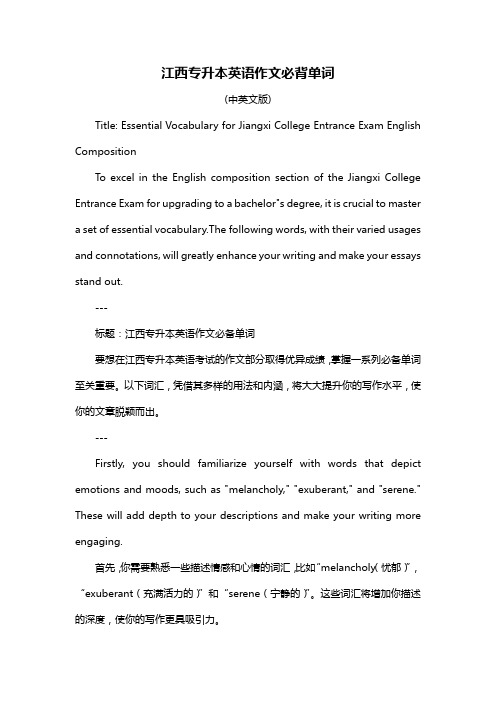
江西专升本英语作文必背单词(中英文版)Title: Essential Vocabulary for Jiangxi College Entrance Exam English CompositionTo excel in the English composition section of the Jiangxi College Entrance Exam for upgrading to a bachelor"s degree, it is crucial to master a set of essential vocabulary.The following words, with their varied usages and connotations, will greatly enhance your writing and make your essays stand out.---标题:江西专升本英语作文必备单词要想在江西专升本英语考试的作文部分取得优异成绩,掌握一系列必备单词至关重要。
以下词汇,凭借其多样的用法和内涵,将大大提升你的写作水平,使你的文章脱颖而出。
---Firstly, you should familiarize yourself with words that depict emotions and moods, such as "melancholy," "exuberant," and "serene." These will add depth to your descriptions and make your writing more engaging.首先,你需要熟悉一些描述情感和心情的词汇,比如“melancholy(忧郁)”,“exuberant(充满活力的)”和“serene(宁静的)”。
成考英语作文必备单词大全

成考英语作文必备单词大全Title: Essential Vocabulary for English Composition in Adult Education Exams。
In adult education exams, particularly in English composition, a robust vocabulary is indispensable. Mastering a wide array of words enhances your ability to express ideas eloquently and precisely. Below is a comprehensive compilation of essential vocabulary that can greatly enrich your writing prowess:1. Introduction Vocabulary:Introduction Phrases: Firstly, to begin with, it is well-known that, in today's society, etc.Thesis Statement Vocabulary: Arguably, it can be argued that, it is evident that, etc.2. Transition Words and Phrases:Transition Words: Additionally, moreover, furthermore, nevertheless, however, etc.Transition Phrases: On the other hand, in contrast, similarly, consequently, as a result, etc.3. Descriptive Vocabulary:Adjectives: Exquisite, magnificent, serene, formidable, vibrant, etc.Adverbs: Incredibly, remarkably, profoundly, substantially, exceedingly, etc.Sensory Words: Aroma, mellifluous, poignant, luminous, tantalizing, etc.4. Persuasive Vocabulary:Persuasive Phrases: It is imperative that, it is essential to, one cannot deny that, etc.Powerful Adjectives: Compelling, persuasive, compelling, convincing, influential, etc.Rhetorical Devices: Repetition, rhetorical questions, parallelism, analogy, etc.5. Narrative Vocabulary:Narrative Phrases: Once upon a time, subsequently, eventually, meanwhile, thereafter, etc.Vivid Verbs: Gallop, plummet, scurry, flourish, transcend, etc.Dialogue Tags: Exclaimed, murmured, retorted, queried, interjected, etc.6. Analytical Vocabulary:Analytical Phrases: In light of, considering, with regard to, in the context of, etc.Critical Adjectives: Imperative, pivotal, paramount, indispensable, fundamental, etc.Logical Connectors: Consequently, accordingly, hence, thus, therefore, etc.7. Conclusion Vocabulary:Conclusion Phrases: In conclusion, to summarize, ultimately, in a nutshell, etc.Final Remarks: In essence, all things considered, it is evident that, etc.8. Academic Vocabulary:Subject-Specific Terms: Hypothesis, methodology, analysis, synthesis, conclusion, etc.Discipline-Specific Jargon: Anthropology, sociology, psychology, economics, etc.9. Miscellaneous Vocabulary:Idioms and Phrasal Verbs: Break the ice, hit the nail on the head, keep an eye on, etc.Collocations: Bitter rivalry, burning desire, a ray of hope, etc.10. Word Variations:Synonyms and Antonyms: Amplify diminish, enhance impair, elucidate obscure, etc.Word Families: Educate education educator, perform performance performer, etc.11. Language for Formality:Formal Expressions: Consequently, nonetheless, notwithstanding, henceforth, etc.Polite Language: Would you mind, I would appreciate, please be advised, etc.12. Emotive Vocabulary:Words to Convey Emotions: Ecstatic, devastated, elated, despondent, jubilant, etc.Emotionally Charged Phrases: My heart sank, tears welled up, a lump in my throat, etc.13. Cultural Vocabulary:Cultural References: Shakespearean, Renaissance, Enlightenment, Industrial Revolution, etc.Global Terminology: Multiculturalism, globalization, diaspora, cosmopolitan, etc.14. Advanced Vocabulary:Sophisticated Words: Ostentatious, esoteric,ubiquitous, quintessential, myriad, etc.Elevated Language: Proclivity, enigma, paradigm, ephemeral, indubitably, etc.15. Technical Vocabulary:Technical Terms: Algorithm, encryption, programming, database, cybersecurity, etc.Scientific Vocabulary: DNA, neurotransmitter, quantum mechanics, biodiversity, etc.16. Geographical Vocabulary:Geographical Terms: Archipelago, isthmus, tundra, savanna, plateau, etc.Toponymy: Amazon Basin, Sahara Desert, Himalayan Range, etc.17. Historical Vocabulary:Historical Periods: Middle Ages, Renaissance, Industrial Revolution, Cold War, etc.Historical Figures: Napoleon Bonaparte, Cleopatra, Martin Luther King Jr., etc.18. Legal Vocabulary:Legal Terminology: Jurisdiction, litigation, plaintiff, defendant, subpoena, etc.Legal Concepts: Due process, habeas corpus, precedent, jurisprudence, etc.In conclusion, mastering these diverse sets of vocabulary will undoubtedly bolster your writing skills and significantly enhance your performance in English composition exams. Regular practice and implementation of these words in your writing endeavors will undoubtedlyyield commendable results.。
高中英语选修三unit3必背词块
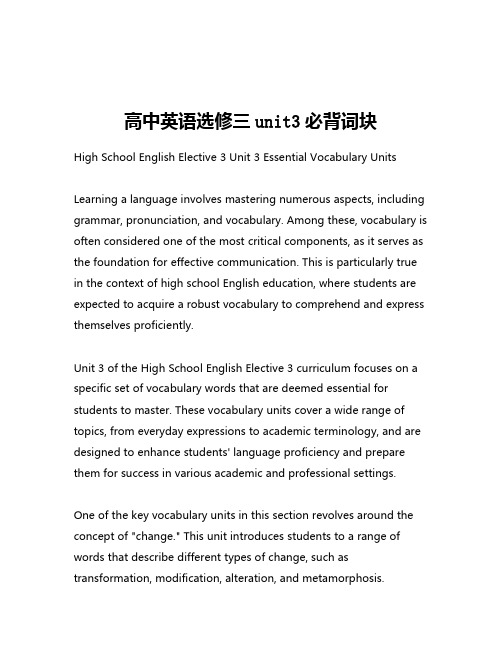
高中英语选修三unit3必背词块High School English Elective 3 Unit 3 Essential Vocabulary UnitsLearning a language involves mastering numerous aspects, including grammar, pronunciation, and vocabulary. Among these, vocabulary is often considered one of the most critical components, as it serves as the foundation for effective communication. This is particularly true in the context of high school English education, where students are expected to acquire a robust vocabulary to comprehend and express themselves proficiently.Unit 3 of the High School English Elective 3 curriculum focuses on a specific set of vocabulary words that are deemed essential for students to master. These vocabulary units cover a wide range of topics, from everyday expressions to academic terminology, and are designed to enhance students' language proficiency and prepare them for success in various academic and professional settings.One of the key vocabulary units in this section revolves around the concept of "change." This unit introduces students to a range of words that describe different types of change, such as transformation, modification, alteration, and metamorphosis.Understanding these words and their nuances is crucial for students to effectively convey their ideas and experiences related to the dynamic nature of the world around them.Another important vocabulary unit focuses on the concept of "time." This unit explores a diverse array of words that capture the various aspects of time, including duration, frequency, pace, and sequence. Mastering these vocabulary items empowers students to articulate their thoughts and experiences with greater precision, enabling them to engage in more sophisticated discussions and analyses.Additionally, the High School English Elective 3 Unit 3 curriculum covers vocabulary related to "human emotions and behaviors." This unit introduces students to a wide range of words that describe various emotional states, interpersonal dynamics, and patterns of behavior. Developing a strong command of this vocabulary allows students to better understand and express the complexities of human experience, enhancing their ability to communicate effectively and empathetically.Furthermore, the curriculum includes a vocabulary unit on "scientific and technological terms." This unit equips students with the specialized language necessary to comprehend and discuss advancements in science, technology, and innovation. By gaining familiarity with these technical terms, students can engage moreconfidently in discussions and analyses related to these crucial fields of study.Beyond these thematic vocabulary units, the High School English Elective 3 curriculum also emphasizes the importance of expanding students' general vocabulary knowledge. This is achieved through the inclusion of activities and exercises that focus on word roots, prefixes, and suffixes. By understanding the etymology and morphological structures of words, students can better infer the meanings of unfamiliar terms and build a more robust and versatile vocabulary.It is worth noting that the process of mastering vocabulary is not merely about memorizing definitions; it also involves developing the ability to use the words in appropriate contexts, both in spoken and written communication. To this end, the High School English Elective 3 curriculum incorporates various interactive learning strategies, such as vocabulary games, group discussions, and writing exercises, to help students actively engage with and apply the vocabulary they have learned.In conclusion, the High School English Elective 3 Unit 3 curriculum's focus on essential vocabulary serves as a crucial component of language acquisition and development. By equipping students with a diverse and nuanced vocabulary, the curriculum empowers them tocommunicate more effectively, express their thoughts and ideas with greater clarity, and engage in more meaningful intellectual discourse. As students continue to build upon this foundation of essential vocabulary, they will be better positioned to succeed in their academic pursuits and navigate the complexities of the modern world.。
出国旅游简单英文用词
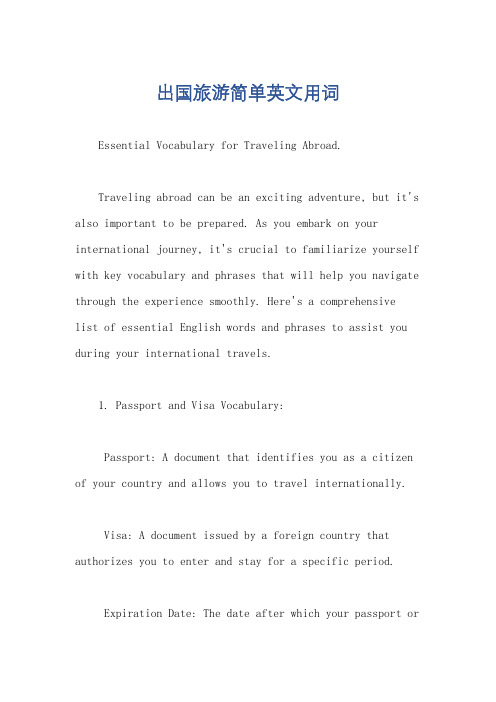
出国旅游简单英文用词Essential Vocabulary for Traveling Abroad.Traveling abroad can be an exciting adventure, but it's also important to be prepared. As you embark on your international journey, it's crucial to familiarize yourself with key vocabulary and phrases that will help you navigate through the experience smoothly. Here's a comprehensivelist of essential English words and phrases to assist you during your international travels.1. Passport and Visa Vocabulary:Passport: A document that identifies you as a citizen of your country and allows you to travel internationally.Visa: A document issued by a foreign country that authorizes you to enter and stay for a specific period.Expiration Date: The date after which your passport orvisa is no longer valid.Renew: To extend the validity of your passport or visa.2. Airport Terminology:Check-in: The process of registering for a flight and receiving your boarding pass.Gate: The specific area where your flight departs from.Security: The area where you pass through security checks.Boarding Pass: A document that proves your reservation on a flight.Duty-free: Items that can be purchased without paying taxes or duties.3. Accommodation Terms:Hotel: A place that provides lodging for travelers.Reservation: The act of booking a room in a hotel or other accommodation.Check-in: Arriving at your accommodation and registering.Check-out: Leaving your accommodation and settling any outstanding bills.Room Service: Meals or other services provided within your room.4. Transportation Vocabulary:Taxi: A mode of transportation that provides hired services.Public Transportation: A system of vehicles, such as buses, trains, or subways, that serve the public.Rental Car: A vehicle that you rent for temporary use.Driver's License: A document that authorizes you to drive a vehicle.Gas Station: A facility where you can purchase fuelfor your vehicle.5. Dining Out Expressions:Menu: A list of available dishes and beverages.Waiter/Waitress: A person who serves customers in a restaurant.Order: To request a specific dish or beverage.Tip: A small amount of money given to awaiter/waitress as a token of gratitude.Dessert: A sweet dish served at the end of a meal.6. Shopping Terminology:Store: A place where goods are sold.Price Tag: A label indicating the cost of an item.Discount: A reduction in the price of an item.Currency Exchange: The process of converting one currency into another.Duty-free Shop: A store that sells items without added taxes or duties.7. Cultural and Etiquette Expressions:Customs: The traditional practices and rules of behavior in a particular culture.Greeting: A polite way of acknowledging someone's presence.Tipping: Giving a small amount of money to service providers as a token of appreciation.Queue: Waiting in line in an orderly fashion.Respectful: Showing regard and deference to others.Remembering these essential vocabulary words and phrases will help you feel more confident and prepared during your next trip abroad. It's always advisable to familiarize yourself with the local customs and etiquette of your destination to ensure a smooth and enjoyable experience. Happy travels!。
专升本英语词汇书 -回复
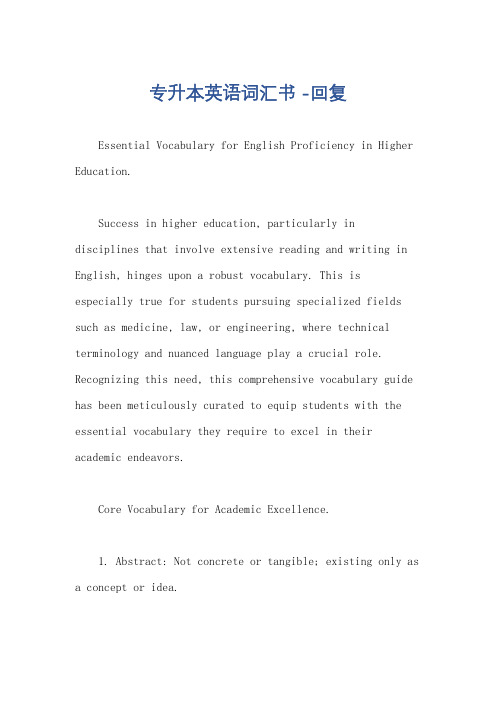
专升本英语词汇书 -回复Essential Vocabulary for English Proficiency in Higher Education.Success in higher education, particularly indisciplines that involve extensive reading and writing in English, hinges upon a robust vocabulary. This isespecially true for students pursuing specialized fields such as medicine, law, or engineering, where technical terminology and nuanced language play a crucial role. Recognizing this need, this comprehensive vocabulary guide has been meticulously curated to equip students with the essential vocabulary they require to excel in their academic endeavors.Core Vocabulary for Academic Excellence.1. Abstract: Not concrete or tangible; existing only asa concept or idea.2. Analysis: The process of breaking something down into its component parts to examine its structure and relationships.3. Argument: A statement or group of statements that support a particular point of view.4. Cite: To mention a source as evidence for a statement or claim.5. Critique: To examine and evaluate something in detail, often with a critical eye.6. Define: To provide a precise meaning for a word or phrase.7. Evidence: Information or data that supports a claim or argument.8. Hypothesis: A tentative explanation for an observation or phenomenon that can be tested through experimentation.9. Interpretation: The act of explaining or giving meaning to something.10. Methodology: The system of methods and principles used in a particular field of study.Specialized Vocabulary for Specific Disciplines.In addition to core academic vocabulary, students may need to acquire specialized vocabulary related to their chosen field of study. Here are a few examples:Medicine:1. Anatomy: The study of the structure of the human body.2. Etiology: The study of the causes of disease.3. Pathology: The study of the causes and effects of disease.4. Pharmacology: The study of the effects of drugs on the body.5. Physiology: The study of the normal functioning of the body.Law:1. Civil law: The body of law that governs private relationships between individuals.2. Criminal law: The body of law that governs crimes and their punishment.3. Equity: A system of law that seeks to supplement or correct the common law.4. Jurisprudence: The philosophy of law.5. Tort: A civil wrong for which the injured party can seek compensation.Engineering:1. Algorithm: A finite set of instructions for solvinga problem.2. Calculus: The branch of mathematics that deals with rates of change.3. Dynamics: The study of the forces that act on moving objects.4. Electricity: The study of electrical phenomena.5. Thermodynamics: The study of heat and its relation to other forms of energy.Expanding Your Vocabulary.Building a strong vocabulary is an ongoing process that requires consistent effort. Here are a few tips to help you expand your vocabulary:1. Read extensively: Immerse yourself in a variety of reading materials, including books, articles, and academic texts.2. Use a dictionary and thesaurus: Consult a dictionary to clarify unfamiliar words and a thesaurus to find synonyms and antonyms.3. Practice active recall: Regularly test your memory by trying to recall words from your vocabulary list.4. Use flashcards: Create flashcards with new words and their definitions to reinforce your learning.5. Engage in discussions: Participate in class discussions and engage in conversations with others to practice using new vocabulary.Conclusion.A robust vocabulary is an indispensable tool foracademic success. By mastering the core vocabulary presented in this guide and expanding your vocabulary through continuous learning, you will be well-equipped to navigate the complexities of higher education and excel in your chosen field of study.。
英语二作文必备词汇
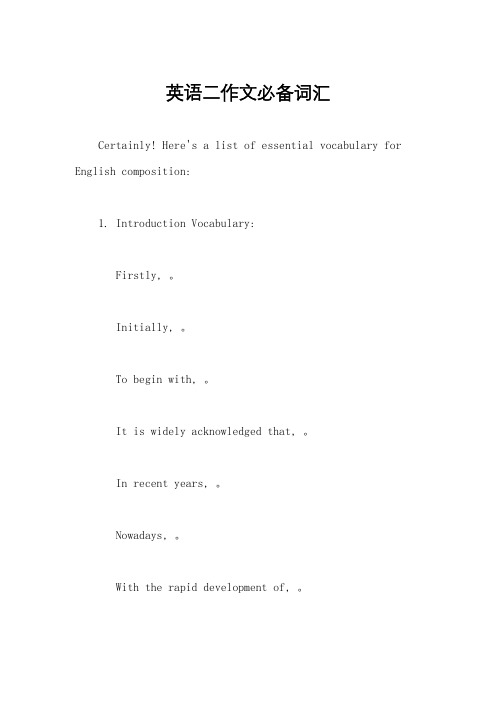
英语二作文必备词汇Certainly! Here's a list of essential vocabulary for English composition:1. Introduction Vocabulary:Firstly, 。
Initially, 。
To begin with, 。
It is widely acknowledged that, 。
In recent years, 。
Nowadays, 。
With the rapid development of, 。
In contemporary society, 。
2. Thesis Statement Vocabulary:This essay will argue that, 。
It is evident that, 。
It is essential to consider that, 。
The main purpose of this essay is to demonstrate that, 。
This paper aims to explore, 。
3. Body Paragraph Vocabulary:Furthermore, 。
Moreover, 。
Additionally, 。
In addition to, 。
On the other hand, 。
However, 。
Nevertheless, 。
Nonetheless, 。
Despite this, 。
In contrast, 。
Subsequently, 。
Consequently, 。
Therefore, 。
Thus, 。
Hence, 。
As a result, 。
4. Transitional Vocabulary: Another key point is, 。
Moving on to, 。
Let us now turn to, 。
Now, let's consider, 。
- 1、下载文档前请自行甄别文档内容的完整性,平台不提供额外的编辑、内容补充、找答案等附加服务。
- 2、"仅部分预览"的文档,不可在线预览部分如存在完整性等问题,可反馈申请退款(可完整预览的文档不适用该条件!)。
- 3、如文档侵犯您的权益,请联系客服反馈,我们会尽快为您处理(人工客服工作时间:9:00-18:30)。
Essential Vocabulary1.[C] an organization that has been established in order to provide money for aparticular group of people in need of help or for a particular type of study;[U] when an organization, state, etc. is established.fund/foundation/fundingThe company has agreed to fund my trip to Australia.the Environmental Research Foundationthe foundation of a new state2.forming the base, from which everything else originates; more important thananything else.fundamentalWe need to make fundamental changes to the way in which we treat our environment. It's one of the fundamental differences between men and women.fundamentally fundamentals3.very sudden or noticeable, or full of action and excitement.dramatica dramatic change/improvementWe watched scenes of the dramatic (= exciting) rescue on the news.drama dramatically4.[U] the state of things as they are, rather than as they are imagined to be;[C] a fact.realityThe reality of the situation is that unless we find some new funding soon, the youth centre will have to close.He escaped from reality by going to the cinema every afternoon.5.to finish something successfully or to achieve something.accomplishThe students accomplished the task in less than ten minutes.If you are fit, the climb can be accomplished in less than three hours. accomplishment accomplished6.to get something, especially by asking for it, buying it, working for it or producingit from something else.obtainto obtain permissionFirst editions of these books are now almost impossible to obtain.In the second experiment they obtained a very clear result.obtainable7.to obtain something that is useful, that gives you an advantage, or that is in someway positive, especially over a period of time;when you get something useful or positivegainThe Nationalist Party have gained a lot of support in the south of the country.What do you hope to gain from the course?The thieves gained entrance through an upstairs window that was left open.She's finally gained (in) confidence over the last couple of years.8.able to be obtained, used, or reached.availableIs this dress available in a larger size?There's no money available for an office party this year.Every available officer will be assigned to the investigation.Do you have any double rooms available this weekend?availability9.to give something, especially money, in order to provide or achieve somethingtogether with other people;to write articles for a newspaper, magazine or book.contributeCome to the meeting if you feel you have something to contribute.Her family has contributed £50, 000 to the fund.She contributes to several magazines.contributor contribution contributory10.to give or to be a good reason for.justifyAre you sure that these evidences are justified?Her actions were quite justifiable (= there was a good reason for them) in the circumstances.justifiable justifiably justificationEssential Vocabulary11.correct, exact and without any mistakes.accurateThe dates they have used are just not accurate.Her novel is an accurate reflection of life in post-war Spain.We hope to become more accurate in predicting earthquakes.accurately accuracy12.to say that something is true or is a fact, although you cannot prove it and otherpeople might not believe it.claimThe company claims (that) it is not responsible for the pollution in the river.He claims to have met the President, but I don't believe him.All parties have claimed success in yesterday's elections.An unknown terrorist group has claimed responsibility for this morning's bomb attack.13.to represent or describe someone or something in a painting, film, book or otherartistic work.portrayThe painting portrays a beautiful young woman in a blue dress.The writer portrays life in a small village at the turn of the century.14.to use something such as authority, power, influence, etc. in order to makesomething happen.exertIf you were to exert your influence they might change their decision.Some managers exert considerable pressure on their staff to work extra hours without being paid.(MAKE AN EFFORT) verbI was too tired to exert myself.exertion15.a single person or thing, especially when compared to the group or set to whichthey belong;existing and considered separately from the other things or people in a group;belonging or relating to, or suitable for, people or things that are different or particular in some way;a person who thinks or behaves in their own original wayindividualEvery individual has rights which must never be taken away.Each individual table is finished by hand.We deal with each case on an individual basis.Marion has a very individual writing style.The children will first sing individually and then together as a group.Individually individualize16.(crime)to do something illegal or something that is considered wrong;(promise)to promise or give your loyalty, time or money to a particular principle, person or plan of action;(send)to send someone officially to prison or hospitalcommitHe was sent to prison for a crime that he didn't commit.Fresh evidence has recently come to light which suggests that he didn't in fact commit the murder.The government must commit itself to improving health care.I think I can come but I won't commit myself till I know for sure.a committed Christian/teacherWe are committed to withdrawing our troops by the end of the year.Try the product out in your own home with absolutely no commitment to buy!He's been committed to prison.committed commitment17.a small group of people chosen to represent a larger organization and either makedecisions or gather information for itcommitteeShe sits on/is on the school's development committee.The local council have just set up a committee to study recycling.18.(argue) 坚决主张、劝说to formally request that especially a legal or officialdecision is changed;a request especially to a court of law to change a previous decision;(request)to make a serious or formal request, especially to the public, for money or help(attract)to interest or attract someonethe quality in someone or something that makes them attractive or interesting appealThe footballer appealed to the referee for a free kick.They're appealing to the High Court to reduce the sentence to a fine.The police are appealing to the public for any information about the missing girl. Church leaders have appealed to the government to halt the war.They're launching (= starting) an appeal to raise money for famine victims.It's a programme designed to appeal mainly to 16 to 25 year-olds.Her films have a wide appeal.appealing19.a general development or change in a situation or in the way that people arebehavinga new development in clothing, make-up, etctrendThere's been a downward/upward trend in sales in the last few years.He writes for some trendy magazine for the under-30s.This is where all the North London trendies go for a night out.trendy20.to improve the quality, amount or strength of somethingenhanceThese scandals will not enhance the organization's reputation/image.Music can be a mood enhancer.enhancement enhancerEssential Vocabulary21.to encourage the popularity, sale, development or existence of something promoteAdvertising companies are always having to think up new ways to promote products. The band are currently touring to promote their new album.promoter(推销员、出资人)22.activities to advertise somethingwhen something is encouraged to happen or developpromotionthe promotion of a healthy lifestyleHer promotion to Sales Manager took everyone by surprise.23.to speak, act or be present officially for another person or peopleto show or describe something or someone, to be a sign or symbol of something; representThey chose a famous barrister to represent them in court.He represents himself as an expert, but he knows nothing.To many people the Queen represents the former glory of Britain.representation representative24.to move someone or something from one place, vehicle, person or group toanother;to make something the legal property of another persontransferWe were transferred from one bus into another.Police are investigating how £20 million was illegally transferred from/out of the Trust's bank account.He threatened to give up football if his club didn't transfer him (= sell him to another team).She transferred the house to her daughter before she died.transference transferable25.not very willing to do something and therefore slow to do it.reluctantMany parents feel reluctant to talk openly with their children.She persuaded her reluctant husband to take a trip with her.She reluctantly agreed to step down as managing director.Her reluctance to talk to the press was quite understandable.26.to examine a crime, problem, statement, etc. carefully, especially to discover thetruthinvestigatePolice are investigating allegations of corruption involving senior executives.An investigation has been under way for several days into the disappearance of a thirteen-year-old boy.Children are encouraged to take an investigative approach to learning. investigation investigative investigator27.always behaving or happening in a similar, especially positive way;in agreement with other facts or with typical or previous behaviour, or having the same principles as something elseconsistentHer work is sometimes good, but the problem is she's not consistent.The President has consistently denied the rumours.We do not consider his behaviour to be consistent with the holding of a high-ranking job.consistently28.to give all of something, especially your time, effort or love, or yourself, tosomething you believe in or to a person;[passive] to use a space, area, time, etc. for a particular purposedevoteHe left government to devote more time to his family.She has devoted all her energies/life to the care of homeless people.At the age of 25, he decided to devote himself to God.devoted devotedly devotion29.(give oreders)to give orders, or state something exactly, with total authority;(order)an order which should be obeyed, often one which you give to yourself (speak)to speak something aloud for a person or machine to record the words said, so that they can be written down.dictateI wanted to take a year off, but my financial situation dictated that I got a job.The UN will dictate the terms of troop withdrawal from the region.The party's change of policy has been dictated by its need to win back the support of voters.She spent the morning dictating letters to her secretary.dictation30.central and importantpivotala pivotal figure/role/ideapivot:a fixed point supporting something which turns or balances;the central or most important person or thing in a situation.Essential Vocabulary31.(solve)to solve or end a problem or difficulty(decide)to make a decision formally or with determinationresolveThe couple resolved their differences and made an effort to get along.a successful resolution to the crisisShe resolved that she would never speak to him again.The company resolved to take no further action against the thieves.resolute resolutely resolution32.to treat a person or particular group of people differently, especially in a worseway from the way in which you treat other people, because of their skin colour, religion, sex, etc;to be able to see the difference between two things or peoplediscriminateShe felt she had been discriminated against because of her age.In order to increase the number of female representatives, the selection committee decided to discriminate in favour of women for three years.racial/sex discriminationdiscrimination discriminatory33.to show the meaning or truth of something more clearly, especially by givingexamples;to draw pictures for a book, magazine, etcillustrateThis latest conflict further illustrates the weakness of the UN.This delay is a perfect illustration of why we need a new computer system.Falling house prices are illustrative of the crisis facing the construction industry.a beautifully illustrated book/old manuscriptblack and white illustrationsillustration illustrator illustrativerge or of noticeable importanceconsiderableThe fire caused considerable damage to the church.He's considerably fatter than he was when I knew him.considerably35.extremely important or necessarycrucialHer work has been crucial to the project's success.It is crucial that the problem is tackled immediately.crucially36.to collect a large number of things over a long period of time;to graduallyincrease in number or amount.accumulateAs people accumulate more wealth, they tend to spend a greater proportion of their incomes.A thick layer of dust had accumulated in the room.Despite this accumulation of evidence, the Government persisted in doing nothing. accumulation37.to state or make known, especially publicly;to show that something is going tohappenannounceThe government has announced that public spending will be increased next year.The first few leaves announced the beginning of autumn.The President made an unexpected announcement this morning.a radio/TV announcerannouncement announcer38.to think that someone has committed a crime or done something wrong; to not trust;to doubt.suspectThree suspected terrorists have been arrested.Police have issued a photograph of the suspect.Her behaviour was very suspiciousHis strange behaviour aroused/raised his neighbours' suspicions.suspicions suspicious39.to not have or not have enough of something that is needed or wanted;the absenceof something or when there is not enough of it.lackHe just lacks a little confidence.We are lacking three members of staff due to illnessIf he fails it won't be for/through lack of effort (= he has certainly tried).He's totally lacking in charm.lacking40.to try to deal with something or someone;(in football or hockey) to try to take the ball from a player in the other team tackleThere are many ways of tackling this problem.He was tackled in the goalmouth.Essential Vocabulary41.to recognize someone or something and say or prove who or what they are identifyEven the smallest baby can identify its mother by her voice.The gunman in Wednesday's attack has been identified as Lee Giggs, an unemployed truck driver.Most of the bodies were badly burned, making identification almost impossible. Identifiable identification42.(own)to have or own something, or to have a particular quality(control) to take control over a person's mind, making that person behave in a very strange waypossessI don't possess a single DVD (= I don't have even one DVD).The possession of large amounts of money does not ensure happiness.a former overseas possessionWe've already bought the house but we won't take possession of it until May.He's a bit possessive about his CDs - I wouldn't dare ask to borrow them.Her boyfriend was getting too possessive so she finished with him.possessed possessive possessor43.(not pleased)saying that someone or something is bad or wrong(important)of the greatest importance to the way things might happen(giving opinions)giving opinions or judgements on books, plays, films, etc(serious)extremely serious or dangerouscriticalThe report is highly critical of safety standards at the factory.The President's support is critical (to this project).Both drivers are critical/in a critical condition (= so badly hurt that they might die) after the 120mph crash.They were both critically injured in the crash.critically criticize44.to make something more difficult to deal with, do or understandcomplicateIt will only complicate the situation if we invite his old girlfriend as well.The rescue operation has been complicated by bad weather.The breathing problem has now been complicated by a chest infection.Dave couldn't find his passport at the airport and then there were further complications when Fiona lost her baggage.If there are no complications, the doctor says that she'll be able to come home in two weeks.45.(quality)[C or U] the particular combination of qualities in a person or placethat makes them different from others(representation)a person represented in a film, play or story(person)a person, especially when you are describing a particular quality that they havecharacterOne of the joys of being a parent is watching the child's character develop.It's not in his character to be (= he is not usually) jealous.She had Mickey Mouse or some other cartoon/Disney character on her sweater. There were one or two strange-looking characters hanging around the bar. characteristic characteristically characterize46.able to do things effectively and skillfully, and to achieve resultscapableWe need to get an assistant who's capable and efficient.A force 10 wind is capable of blowing the roofs off houses.incapable capability capablly47.unusual or special and therefore surprising and worth mentioningremarkableMeeting you here in Rome is a remarkable coincidence.The 20th century was remarkable for its inventions.It is a remarkably noisy and crowded city.remarkably48.to (cause to) start burning or explode; to cause a dangerous, excited or angrysituation to beginigniteThe fuel spontaneously ignites because of the high temperature and pressure.Switch/Turn the ignition on.The proposed restrictions have ignited a storm of protest.49.to make someone feel that they want to do something and can do it;to make someone have a particular strong feeling or reaction;to give someone an idea for a book, film, product, etc.inspireHis confident leadership inspired his followers.The piece of music is inspired by dolphin soundsThe design of the car has inspired many imitations.The golden autumn light provided the inspiration for the painting.He had an inspiration - why not apply for some government money?She has been an inspiration to us all.Inspiration inspirational inspired inspiring50.(cause sadness)to cause someone to feel unhappy and without hope for the future;(reduce) to reduce the value of something, especially money; to reduce the amount of activity in something, especially a business operation; to lower the level or amount of something(press down)to press down or lowerdepressIt depresses me to think that I'll probably still be doing exactly the same job in ten years' time.Alcohol is a depressant.These drugs have a depressant effect.She became deeply depressed when her husband died.The story was depressingly familiar.The rise in the value of the dollar has depressed the company's earnings/profits this year.High interest rates are continuing to depress the economy.depressant depressed depressing depressingly depressionEssential Vocabulary51.extremely angryfuriousI was late and he was furious with me.He's furious about/at the way he's been treated."Get out of here!" she shouted furiously (= in a very angry way).furiously furiousness52.very frightenedterrifiedThe idea of parachuting out of a plane terrifies me.I'm terrified of the dark.She's terrified (that) her mother might find out her secret.Terrify terrifying terrifyingly terror terrorist53.a feeling of extreme worry, sadness or pain;when you are suffering or are in great danger and therefore in urgent need of help;to make someone feel very upset or worried.distressShe claimed that the way she had been treated at work had caused her extreme emotional and psychological distress.a distress signalI hope I haven't distressed you with all these personal questions.She was deeply distressed by the news of his death.The government is taking steps to stimulate business development in (economically) distressed areas (= those in economic difficulty).It was deeply distressing for him to see his wife in such pain.Distressed distressing distressingly54.dishonestly using your position or power to your own advantage, especially formoney; morally badto make someone or something become dishonest or immoralcorruptBoth companies are under investigation for corrupt practices.The whole system was corrupt - every official she approached wanted money before helping her.The study claimed that violence on television corrupts the minds of children. Perhaps some systems of government are more corruptible than others.Political corruption is widespread throughout the country.corruptible corruption55.the moral or legal right or ability to control;a group of people with official responsibility for a particular area of activity;an expert on a subject.authorityThe United Nations has used/exerted/exercised its authority to restore peace in the area.We need to get the support of someone in authority (= an important or high-ranking person).I'll give my lawyers authority (= permission) to act on my behalf.He's got no authority over (= ability to control) his students.the health authorityShe's a world authority on 19th-century Irish history.56.unkind words or actions that make someone or something look stupid or worthlessto laugh at someone in an unkind wayridiculeShe was treated with scorn and ridicule by her colleagues when she applied for the job.He's become an object of ridicule (= a person that everyone thinks is stupid and criticizes or laughs at).Do I look ridiculous in this hat?It's ridiculous to expect a two-year-old to be able to read!ridiculous ridiculously57.ridiculous or unreasonable; foolish in an amusing way.absurdIt's an absurd situation - neither of them will talk to the other.Do I look absurd in this hat?He whole situation borders on the absurd.You're behaving absurdly.It was absurdly (= unreasonably) expensive.There are all sorts of absurdities (= things that are ridiculous) in the proposal. absurdly absurdity58.to entertain someone, especially by humorous speech or action or by makingsomeone laugh or smile, or to keep someone happy, especially for a short time amuseI bought a magazine to amuse myself while I was on the train.She was very amused by/at your comments.I looked on in amusement as they started to argue.I play the piano just for my own amusement (= to entertain myself not other people). an amusing story/person/situationamusement amusing amussingly59.not as severe or strong in punishment or judgment as would be expectedlenientThey believe that judges are too lenient with terrorist suspects.In view of the quantity of drugs involved, 16 years was the most lenient sentence (= punishment) the judge could impose.The defending lawyer asked for leniency on the grounds of her client's youth. leniently leniency60.to deal successfully with a difficult situationcopeIt must be difficult to cope with three small children and a job.The tyres on my car don't cope very well on wet roads.He had so much pressure on him in his job that eventually he just couldn't cope. cope with deal withEssential Vocabulary 61.。
